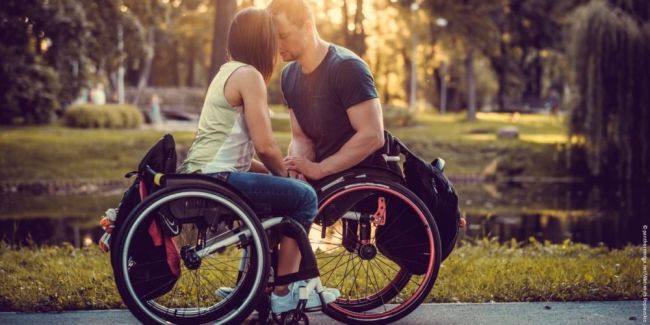Love and disability: Why are there so many prejudices?

Whether with or without a disability, whether homo or hetero sexual - for many people love plays an important role in life.
Things quickly get difficult when people want to claim this basic need, for instance, in their search for a partner: many people without disabilities have prejudices they have a hard time overcoming. Oftentimes they assume that people with disabilities are too needy in a relationship and that sexuality is an aspect that is tough or even impossible to experience with them. That’s why people with disabilities are quickly being eliminated as potential partners. An experience also shared by Anton K.*: "Prior to my current relationship, I have searched for a partner for years online. But every time I mentioned my disability, women broke off all contact."
Carina S.* had similar experiences. Like many other people, she occasionally fell in love and sometimes was rejected of course. "It was important for me to always distinguish between a rejection because of me being in a wheelchair and a simple rejection for all kinds of other reasons," explains the Austrian, who has intentionally lived for years without the desire to be in a relationship. "Having said that, I have learned that all potential partners were obviously and rightly afraid of my wheelchair or my disability. And how would they actually know how everything works? I always knew that I needed to take the first step and put their minds at ease – with words and deeds."
But even people who have a disability don’t automatically consider a partner with a disability. "I have met many men who were born with a disability," says Claudia G.*, who has a walking impairment and uses a wheelchair. "Oftentimes, these men seemed very dependent and wallowed in self-pity. I didn’t find that at all attractive! That said a disability is not automatically a deal breaker for me!" Maria E.* who has autism also describes how she is currently not able to envision being in a relationship with a person who has the same disability. "I need someone, who compensates for the parts that I am missing. Someone, who gets along well with other people or isn’t easily stressed out and overwhelmed. Having said that, another disability, for instance, a physical one, does not matter to me."
"This might sound crazy but I cannot imagine having a partner with a (visible) disability," admits Denise H. "This is something I simply couldn’t get into. I would be afraid of being judged by society stating things like, 'It’s great that people with disabilities keep to themselves' and criticism like, 'How can people be so irresponsible and have children if they both have a disability. Who is going to take care of them...' – that would be too much of an emotional burden to me."

Does that sound harsh? But it’s often the reality! After all, people on the outside often assume that partners without disabilities make lots of compromises or people don’t understand why somebody would get involved with a person with disabilities in the first place.
That’s something Claudia G.* is also able to confirm: "People really ask questions like 'Do you think he truly loves you? Don’t you think he is just with you out of pity?". Partners have to put up with these and similar comments time and again."
Jan T., who has spasticity has made similar experiences. "My partner who has no disability first had to learn what it’s like to walk through town with me and deal with the looks people give you. Insults like 'Come on, we’ll take care of you. This spaz can’t give it to you' cut deep."
Of course, these types of reactions by outside entities don’t keep people from falling in love if they are generally open to diversity in all areas of life. Needless to say, whether a person has a disability or not doesn’t automatically impart anything about the actual person or his/her character.
"I hope to soon find someone who takes me as I am. That is, open, honest, sometimes a bit loud, sometimes quiet and I also happen to have a disability," says Vanessa R.* "Since I grew up with my disability, it is a part of me just like the color of my eyes. And I believe that just like the color of one’s eyes, a disability should also not be the focal point when you choose a partner. Unfortunately, however, this seems to be a utopian concept so far."
Having said that, the results of a survey of people with different types of disabilities that forms the basis of this article clearly showed that there is hope. Sadly, there are also those who – in their own words – have never been in a relationship because of their disability. But there are also many who have been in a happy relationship for many years and who also had some positive experiences prior to that. The survey included bisexual people and those who live an aromantic life and are happy. Many respondents fluctuate somewhere between disappointments and the hope of soon finding love. Other have already found it. A small representation that permits a glance at the big picture: love comes and goes – whether you have or don’t have a disability.

For some people with disabilities it is more important than for others whether the partner also has a disability him- or herself.
















